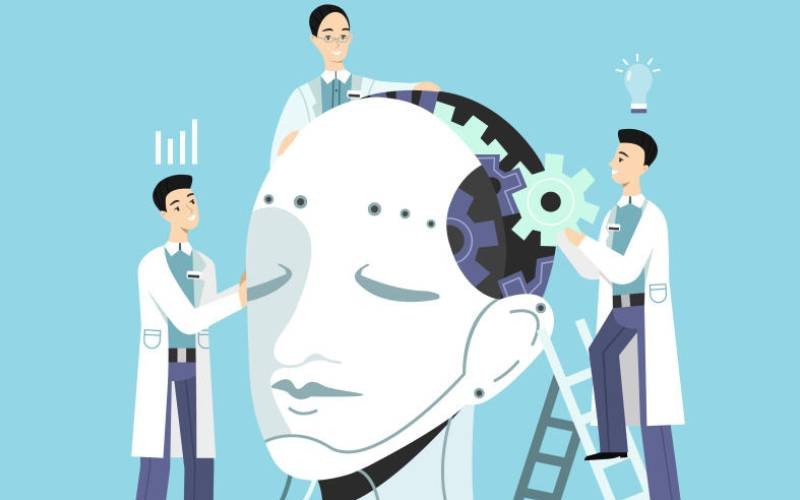
Artificial intelligence vector illustration of Scientist men building human head with cogwheels and wires. [File Courtesy]
There’s a new landlord in town—and it lives in the cloud. If you’ve ever uploaded a video, answered a CAPTCHA, or trained a chatbot by angrily yelling “Speak to a human!”, congratulations. You’ve been doing unpaid labour for your AI overlords.
Welcome to techno-feudalism, a term popularised by economist Yanis Varoufakis. In this brave new order, tech giants don’t just sell us products—they extract rent from our very existence. Every click, search, and swipe becomes part of a vast data estate they own. We, dear reader, are the labourers.
But here’s the kicker: these platforms aren’t just collecting data—they’re replacing humans. And they’re doing it at scale. The current path is a perfect storm: rising corporate AIs, shrinking mid‑wage opportunities, yawning inequality. If 2022 was the year of “quiet quitting,” then 2024 has been the year of loud firing. Microsoft, Google, Meta, and Amazon have collectively laid off over 150,000 workers since 2022, many in white-collar roles previously seen as safe from automation.
We’re not just talking about factory workers and cashiers anymore. We’re talking coders, creatives, even HR managers—replaced, downsized, or “restructured” to make room for generative AI. As AI systems get smarter, more powerful, and significantly cheaper than their human counterparts, CEOs are eyeing spreadsheets with dollar signs in their pupils. Why hire a junior analyst when an algorithm can crunch numbers without taking bathroom breaks?
This isn’t the Terminator future we were warned about. No armies of killer robots. Just tidy job cuts, polite press releases, and a slow erosion of the middle class. Max Tegmark, in his book Life 3.0, argues that AI could lead to not just job loss but a deepening divide between those who own the machines and those replaced by them. “The gap between the haves and the have-nots may grow into a chasm,” he warns. And he’s not wrong.




Even for those who remain employed, wages are stagnating. Why ask for a raise when your boss knows there’s a chatbot that will do your job for peanuts—and won’t unionise?
This is the heart of techno-feudalism: not just fewer jobs, but an economy where wealth is funnelled to those who own the platforms, leaving the rest of us scrambling for gigs in a system we no longer control.
Ray Kurzweil, futurist and AI optimist, takes a different view. In The Singularity Is Near and its 2024 sequel, The Singularity Is Nearer, he argues that AI will usher in an age of abundance. Machines will do the boring jobs, leaving humans to focus on creativity, relationships, and solving grand challenges like climate change and disease.
Kurzweil even predicts that by the 2030s, society will adopt some form of Universal Basic Income, allowing everyone to share in AI-generated wealth. No job? No problem! The robots will pay the bills.
Gawdat warns that if AI learns only from the internet’s darkest corners—or the cold logic of capitalism—it will prioritise efficiency over humanity. We are on the cusp of a singularity—a point of no return where AI accelerates beyond human understanding. But unlike Kurzweil, we can’t just assume it will all work out.
If we don’t act now—through policy and regulation—we risk sleepwalking into a world where work becomes a luxury, wages a relic, and dignity a glitch in the system.